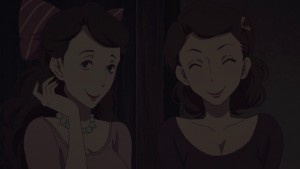 I’m a huge anime fan, but it’s no exaggeration to say that one of the most appealing things about Shouwa Genroku Rakugo Shinjuu is that it’s about the most un-anime anime you’ll ever see. Even Seirei no Moribito, for all its subtlety and emotional realism, had strong fantasy elements (like Shin Sekai Yori) that lent themselves better to anime than to live-action (though this spring will put that to the test). Shouwa Genroku is as true-to-life as it gets, a period drama in the best NHK (or BBC) sense.
I’m a huge anime fan, but it’s no exaggeration to say that one of the most appealing things about Shouwa Genroku Rakugo Shinjuu is that it’s about the most un-anime anime you’ll ever see. Even Seirei no Moribito, for all its subtlety and emotional realism, had strong fantasy elements (like Shin Sekai Yori) that lent themselves better to anime than to live-action (though this spring will put that to the test). Shouwa Genroku is as true-to-life as it gets, a period drama in the best NHK (or BBC) sense.
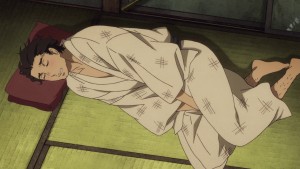 Here’s the thing, though – just because this show could easily be told via live-action doesn’t mean there aren’t things anime can bring to the table that live cannot. In the hands of a director like Omata Shinichi a series like this is like an impressionist painting, allowing a truer-than true-to-life telling of the story. Shinichi can bring a whimsy and tasteful hint of surrealism to the show’s visual palette, allowing him to show the essence of something rather than merely reproducing it.
Here’s the thing, though – just because this show could easily be told via live-action doesn’t mean there aren’t things anime can bring to the table that live cannot. In the hands of a director like Omata Shinichi a series like this is like an impressionist painting, allowing a truer-than true-to-life telling of the story. Shinichi can bring a whimsy and tasteful hint of surrealism to the show’s visual palette, allowing him to show the essence of something rather than merely reproducing it.
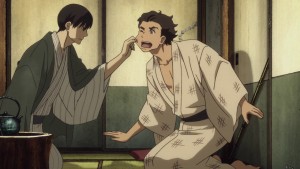 To piggyback on that notion, it struck me watching this episode what an absolute joy it must be for the seiyuu to perform in a series like this one. Make no mistake, an actor is an actor – and for all the work Ishida Akira has done in pop-cultural sensations, I have no doubt he’s always believed he could perform material like this. What a thrill for a voice actor – they get to actually perform rakugo on television! That – and the tremendous emotional subtlety of the narrative – made the casting for this series incredibly important. And it could hardly be more clear that DEEN nailed it. All of them (ironically the main romantic triangle all played major roles in Evangelion) are superb – the youth Yamadera Kouichi is able to project at almost 55 is astonishing. But Ishida is beyond mere praise here – this is a true star turn for him, and he soars with the opportunity.
To piggyback on that notion, it struck me watching this episode what an absolute joy it must be for the seiyuu to perform in a series like this one. Make no mistake, an actor is an actor – and for all the work Ishida Akira has done in pop-cultural sensations, I have no doubt he’s always believed he could perform material like this. What a thrill for a voice actor – they get to actually perform rakugo on television! That – and the tremendous emotional subtlety of the narrative – made the casting for this series incredibly important. And it could hardly be more clear that DEEN nailed it. All of them (ironically the main romantic triangle all played major roles in Evangelion) are superb – the youth Yamadera Kouichi is able to project at almost 55 is astonishing. But Ishida is beyond mere praise here – this is a true star turn for him, and he soars with the opportunity.
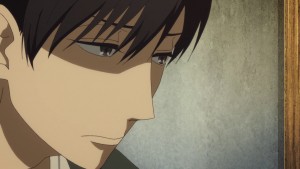 That these are actors playing actors, does, perhaps, add just that little bit of extra imperative and sincerity to their performances. There were no down moments in this episode, but a few do stand out. In the scene where Sukeroku brings two ladies of the evening back to the apartment a few night before the play he’s coerced Kkuhiko to co-star in, the two bicker (as usual) over Sukeroku’s lifestyle, and Kiku lets his petty side show more than he ever has. But he also quite confidently criticizes Sukeroku’s rendition of a role clearly better suited to him, from a story about a prostitute who decides to end her life by staging an elaborate suicide pact. Their exchange goes, in effect, as follows:
That these are actors playing actors, does, perhaps, add just that little bit of extra imperative and sincerity to their performances. There were no down moments in this episode, but a few do stand out. In the scene where Sukeroku brings two ladies of the evening back to the apartment a few night before the play he’s coerced Kkuhiko to co-star in, the two bicker (as usual) over Sukeroku’s lifestyle, and Kiku lets his petty side show more than he ever has. But he also quite confidently criticizes Sukeroku’s rendition of a role clearly better suited to him, from a story about a prostitute who decides to end her life by staging an elaborate suicide pact. Their exchange goes, in effect, as follows:
“You see? You’r never around decent women, so you sound stupid.”
“What’s the problem? It’s cute isn’t it?”
“It’s not good. It’s not beautiful.”
“You’re stiff as ever. If I had to do it that way I’d end up hating rakugo. It’s a tough business, but that’s what rakugo is. You won’t last unless you’re a little stupid.”
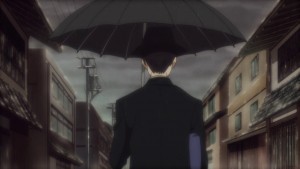 This, to me, says so much about these two men – and about rakugo. Sukeroku has effectively been on stage his entire life, playing his cuteness to the hilt with great success. It’s a gift, a rare one, and Kikuhiko doesn’t share it. But Kikuhiko has a sense of beauty that Sukeroku does not – in a sense, his rakugo is poetry, and Suke’s is prose. And we all know prose is much more popular with the masses than poetry. But there’s a place for Kikuhiko’s rakugo, too – it’s just taking him longer to find that place.
This, to me, says so much about these two men – and about rakugo. Sukeroku has effectively been on stage his entire life, playing his cuteness to the hilt with great success. It’s a gift, a rare one, and Kikuhiko doesn’t share it. But Kikuhiko has a sense of beauty that Sukeroku does not – in a sense, his rakugo is poetry, and Suke’s is prose. And we all know prose is much more popular with the masses than poetry. But there’s a place for Kikuhiko’s rakugo, too – it’s just taking him longer to find that place.
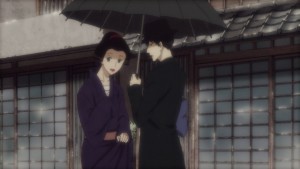 Another memorable scene comes when Miyokichi spots Kikuhiko walking in the rain and more or less drags him back to her okiya. There’s so much tenderness in these moments – one can truly see that Miyokichi loves Kikuhiko (though one might argue in a big sisterly way, albeit a big sister who sleeps with her brother), and just how desperate for the warmth of human contact Kikuhiko is. Sukeroku is capable is tossing off lines like “Let me have a taste of that once in a while” and think he’s being cute, but one can see the explosion building here. Kiku has so little of what comes easily to Sukeroku – he loves only one woman while Sukeroku enjoys the full spectrum of Yoshiwara’s delights. Yet Sukeroku is greedy enough to want the one woman his friend has that he doesn’t. The potential for ill feeling brewing here is formidable to say the least.
Another memorable scene comes when Miyokichi spots Kikuhiko walking in the rain and more or less drags him back to her okiya. There’s so much tenderness in these moments – one can truly see that Miyokichi loves Kikuhiko (though one might argue in a big sisterly way, albeit a big sister who sleeps with her brother), and just how desperate for the warmth of human contact Kikuhiko is. Sukeroku is capable is tossing off lines like “Let me have a taste of that once in a while” and think he’s being cute, but one can see the explosion building here. Kiku has so little of what comes easily to Sukeroku – he loves only one woman while Sukeroku enjoys the full spectrum of Yoshiwara’s delights. Yet Sukeroku is greedy enough to want the one woman his friend has that he doesn’t. The potential for ill feeling brewing here is formidable to say the least.
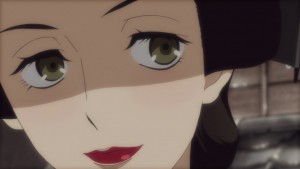 Finally, we have the performance – rather than rakugo, a traditional Japanese play that requires Kiku to dress as a woman to play a man posing as a woman. The play – and the performance – are wonderful, but what really stands out is the dawning of perception Kikuhiko undergoes here. He truly is the star – from the moment he walks on stage (looking beautiful thanks to Miyokichi’s makeup job) every eye in the theatre is on him, and he loves every moment of it. One can see the explosion of confidence in his eyes, of purpose – he knows now that this is where he belongs, that he really does have what it takes to bend an audience to his will. It’s truly the crucial moment in his development as a performer.
Finally, we have the performance – rather than rakugo, a traditional Japanese play that requires Kiku to dress as a woman to play a man posing as a woman. The play – and the performance – are wonderful, but what really stands out is the dawning of perception Kikuhiko undergoes here. He truly is the star – from the moment he walks on stage (looking beautiful thanks to Miyokichi’s makeup job) every eye in the theatre is on him, and he loves every moment of it. One can see the explosion of confidence in his eyes, of purpose – he knows now that this is where he belongs, that he really does have what it takes to bend an audience to his will. It’s truly the crucial moment in his development as a performer.


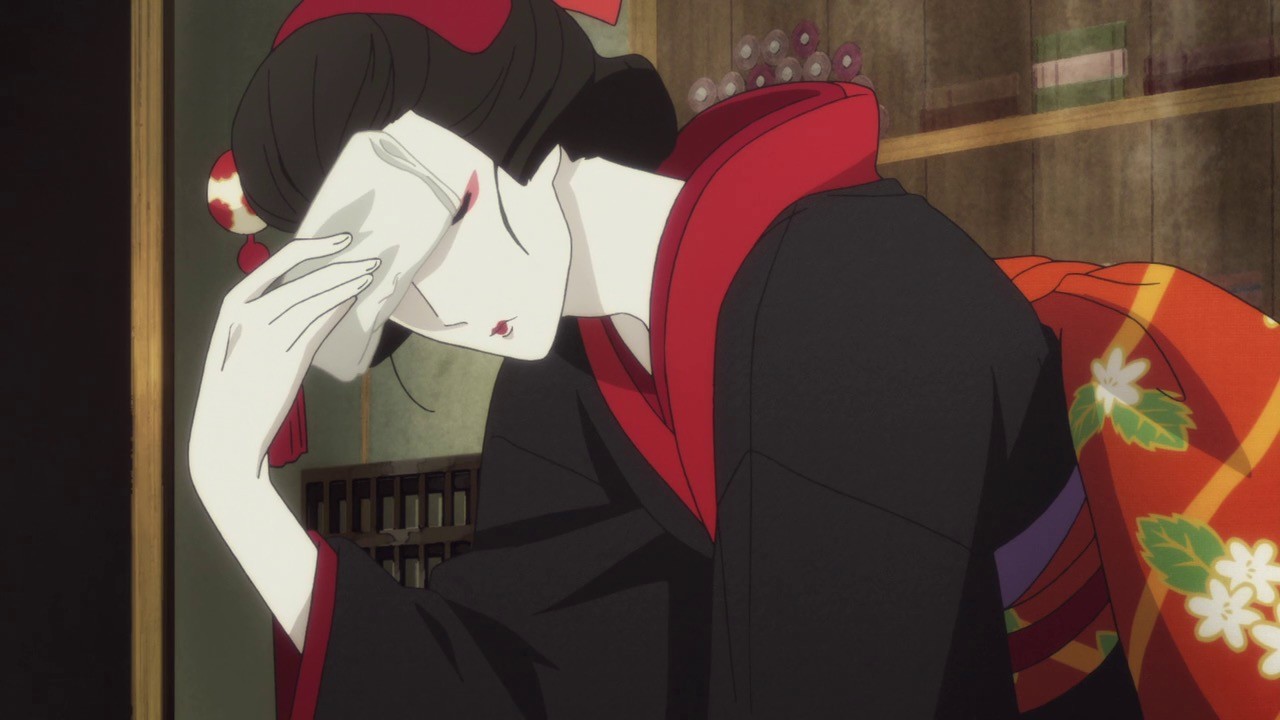
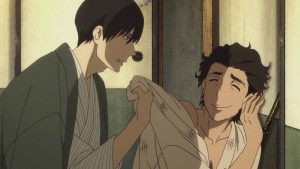
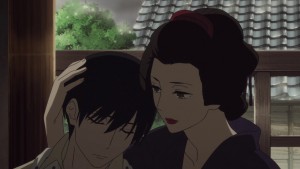
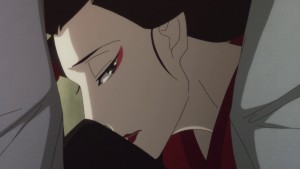
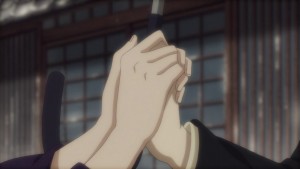
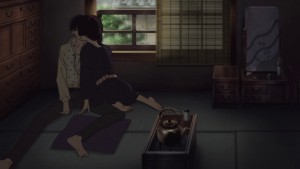
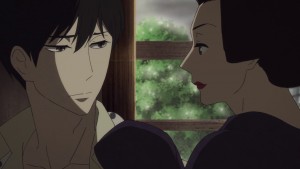
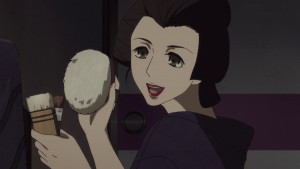
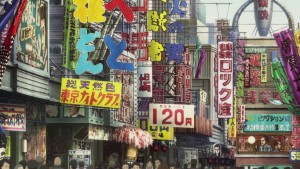
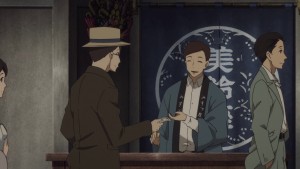
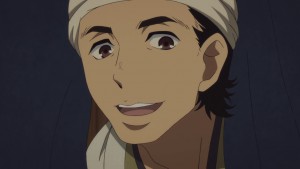
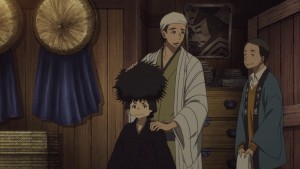
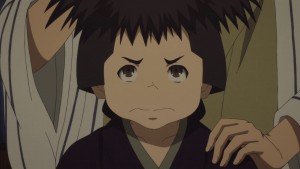
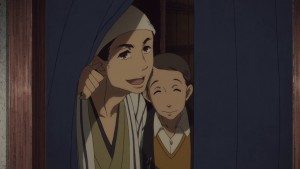
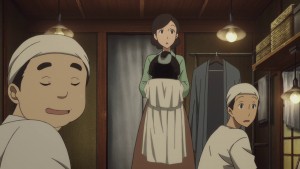
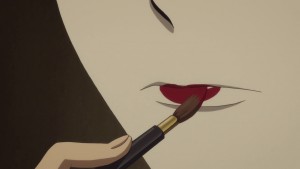
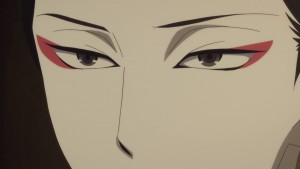
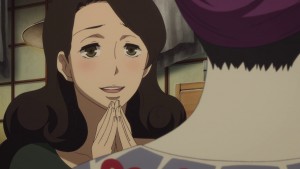
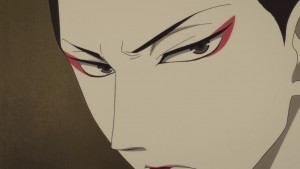
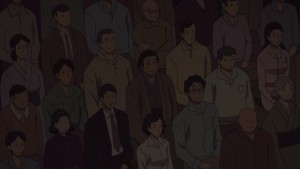
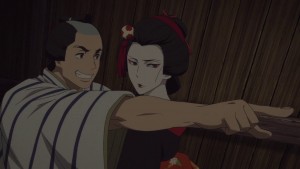
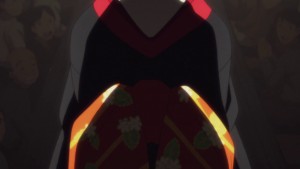
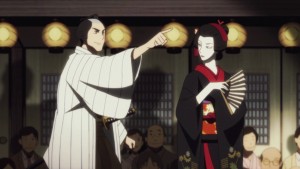
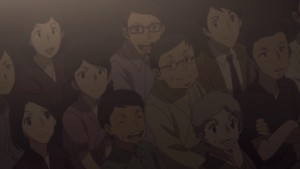
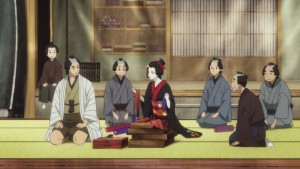
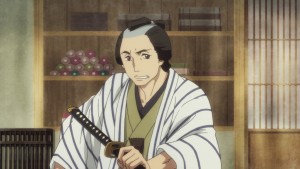
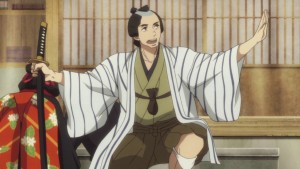
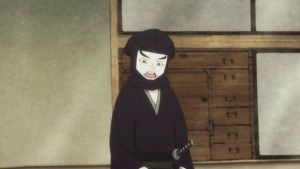
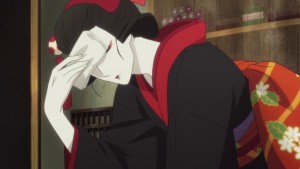
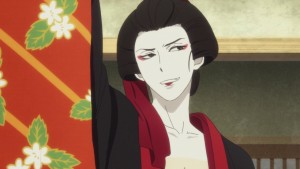
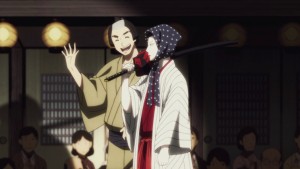
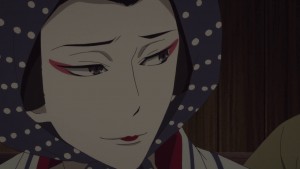
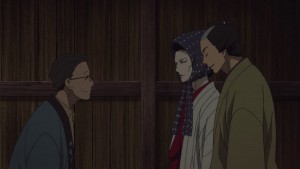
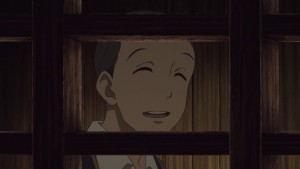
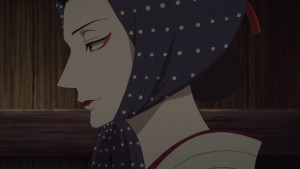
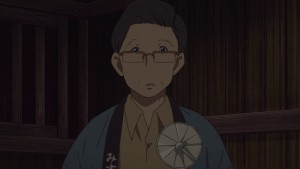
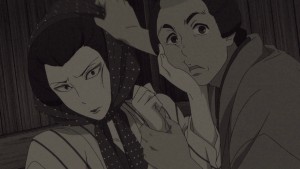
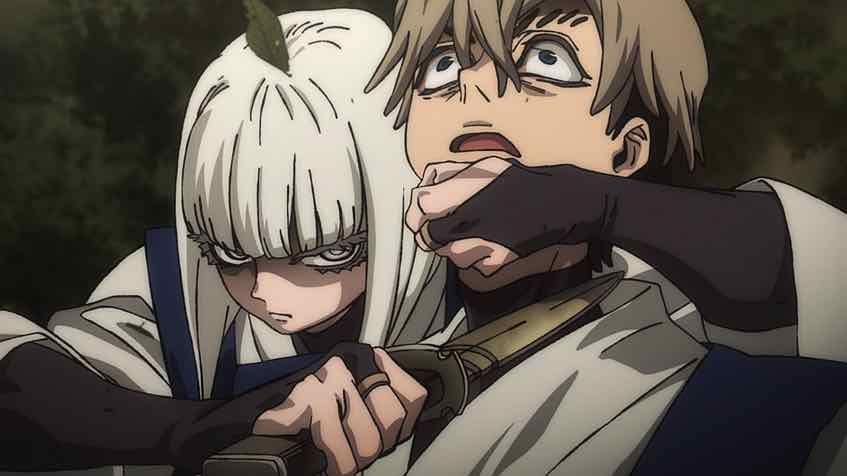
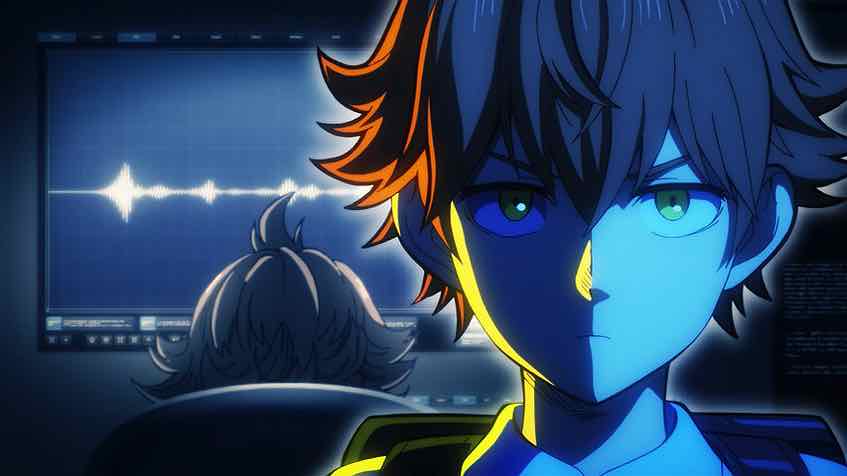
HoTaRu
February 6, 2016 at 6:18 amThe longer I am an anime fan, the less I feel truly drawn to a show. Each season there are rarely more than two shows I am dedicated to watching and it has been quite some time since I have come across one like this. THIS is why I watch anime. I am in awe of each and every episode and cannot understand why it hasn’t been licensed yet. While I have not read the source material, I have read “My Darling Kitten Hair” and Haruko Kumota is one of the best mangaka I’ve come across. With how perfect it already has been, I have no doubt that this show will be a masterpiece. Thank you very much for your reviews on it, especially since something like this does not get the kind of recognition it deserves. (This is my first ever comment on a blog ever. Usually I don’t like how people attack one another over their opinions, but I couldn’t help expressing my thoughts on this since I am totally in love with it!)
Guardian Enzo
February 6, 2016 at 6:43 amWell first of all, quite an honor to have your first ever comment here. And of course I agree with you about this series. As for the last part, I do think you see less of those sorts of attacks here than in most places on the net where anime is discussed – at least I’d like to think so.
Blip
February 6, 2016 at 6:09 pmI completely agree with you on Kumota Haruko. Her work is uncommonly exquisite in a genre saturated with superficial high school male-male romances (and I say this as a frequent BL reader and open fujoshi), and she’s able to bring out the undercurrent of feeling in quieter moments so well that she doesn’t really need to rely on drama to keep things interesting (even though there’s plenty to come).
The-Internet
February 6, 2016 at 12:23 pmThis show shifts between comedy and drama effortlessly.I hope it keeps this up;most anime have a tendency to derail towards the last few episodes as the creator tries to stuff as many ideas in as possible.
Earthling Zing
February 6, 2016 at 12:53 pmI’m really glad you’re covering this, these are some of the more enjoyable posts I’ve read in a while, especially with Boku Dake containing so many plot points you can’t spoil. Kikuhiro and Miyokichi are both fascinating characters, and the development of Kikuhiro this episode progressed very naturally.
Guardian Enzo
February 6, 2016 at 5:04 pmNo question about it, shows with the kind of emotional complexity of this one are great fun to blog. I could have gone 10 paragraphs here no problem.
A. Bazin
February 6, 2016 at 3:22 pmHave you seen this amazing performance by Ishida?
https://youtu.be/HG3EqJizfkQ
Too bad such a versatile voice actor had to act only in bishounen mode for most of the anime he appeared in.
Tai
February 6, 2016 at 3:47 pmAs a theatre person, this show just hits me in all the right places. When Kiku talked about “charm,” I could completely understand where he was coming from. More than that, I enjoyed the exchange between Miyokichi and him. While we, the audience, know how vulnerable Kiku really feels–watching him open up to Miyokichi was moving.
And how about that kuroko (stage manager-ish kind of person) on-stage, huh? I love, love, love these details.
Ronbb
February 6, 2016 at 5:45 pmAnother nice post, Enzo….full of insight and passion for the show.
Interestingly enough, I was recommending my friend to check out Shouwa Genroku, and she had the same thought that this show could be better played in live-action. I really don’t know about that. Besides, isn’t it great that a piece of art can be expressed in multiple forms, and each can bring out a different facet of beauty?
I really love the camera work in Shouwa Genroku. The characters are actors, but the camera work goes deep into what they actually are feeling.
P.S. Thanks for mentioning both Shin Sekai Yori and Seirei no Moribito…I was thinking about them last week when watching both BokuDake and Shouwa Genroku.
Dop
February 6, 2016 at 11:37 pmDefinitely the stand-out part of this episode was the growth in Kikuhiko’s confidence, after his early stage fright. The realisation that the audience were hanging on every word and every gesture, and how that affected his performance was truly splendid to behold, and when you tie that in to the confident performer he becomes, you can see this is the start of something big.
samui
February 7, 2016 at 10:35 amThis is so like Kids on the Slope’s school cultural performance festival!
Well, another outstanding episode care of Studio Deen. Wow.
Simone
February 7, 2016 at 2:27 pmIt struck me that there’s multiple layers to the fact that Kiku’s seeming breakthrough performance was one requiring crossdressing and full makeup. I always thought that what’s truly enjoyable, liberating about acting is the feeling of being “someone else”. I have always been very shy in daily life but I also alway tended to become much bolder whenever given a chance to “perform” a role rather than represent myself (be it in some school play or cosplaying at a convention…). So I think I felt Kiku fully there – having that one protective layer between himself and the public might have been his blessing. Yes, you may be embarrassed and scared – good thing it’s not actually *you* on that scene any more, so who cares!